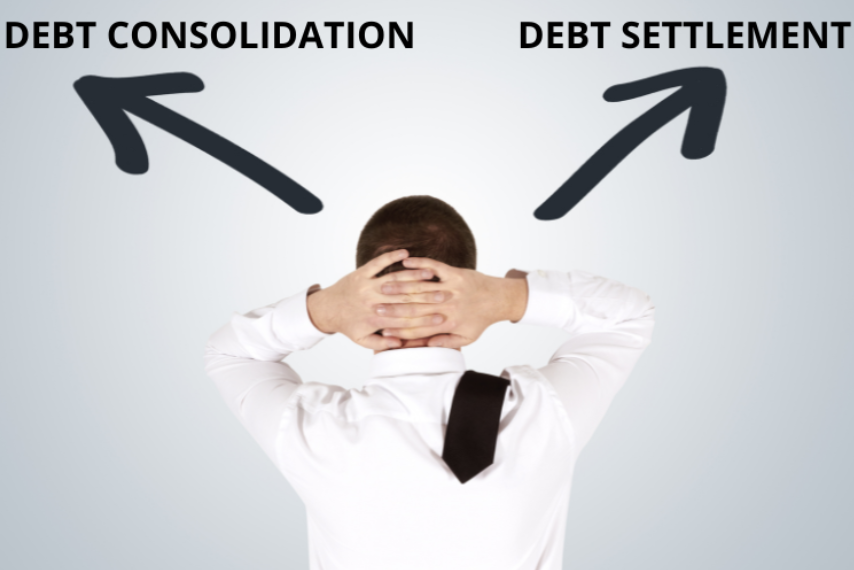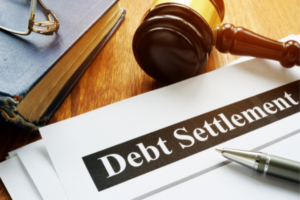
Which Should I Choose: Debt Consolidation or Debt Settlement?
Both debt consolidation and debt settlement are financial strategies for reducing personal debt burdens, but they work in different ways and are used to resolve different issues. Debt settlement is useful for lowering the amount of debt that is owed, whereas debt consolidation is beneficial for reducing the total number of creditors that are owed money.
What is Debt Consolidation?

When you consolidate your debt, you take out a single loan to pay off all your existing loans. All your previous loans are combined into one monthly payment with a single interest rate. Financial institutions, such as banks, credit unions, and internet lenders, offer debt consolidation loans, and all of your debt payments are transferred to the new lender.
The difficulty of managing many debt payments each month can be alleviated by consolidating them into a single monthly payment. Consolidation loans may potentially result in reduced total monthly payments or a lower interest rate on your debts, depending on your situation. Likewise, depending on the duration of the loan payback period, you may be able to save money on interest over time.
What types of debt can you consolidate?
- Credit cards
- Utility debt
- Retail store cards
- Unsecured personal loans
- Gas cards
- Tax debt
- Unsecured lines of credit (LOCs)
What Is Debt Settlement?
Negotiations with your creditors are the basis of a debt settlement. To get your debts absolved, you will usually have to make an offer to your creditors, either in the form of a lump sum or an agreement on a payback schedule. As a general rule, the repayment amount is less than the entire amount of debt you’ve accrued.
Which debts can debt settlement help with?
- Credit card debt
- Unsecured lines of credit
- Medical bills
- Retail store credit card debt
- Utility bills
- Payday loans
- Non-government student loans
- Cell phone bills
The Advantages of Consolidation Loans
Monthly Payment
Multiple credit cards make juggling expenses difficult. It is much simpler to fall behind on payments or to go over the limit on your bank account. With consolidation, you don’t have to pay many banks and creditors. You just have one payment deadline to keep in mind.
Lower rates of interest
When certain conditions are met, obtaining a consolidation loan can enable you to obtain a much more favourable fixed interest rate. This minimizes the monthly interest charged on each payment. You can pay off your debt faster.
Credit-boosting
When you use the loan to pay off your debts, it will be clear that those debts have been settled in their entirety. When you manage your finances well, you can prevent the damage to your credit that can result from missed payments. Your credit score ought to improve as a result of consolidation if you are successful in maintaining timely repayment of the consolidated loans.
Reduced pressure from various creditors
If you’ve fallen behind on any of your minimum payment obligations, creditors and collection agencies may begin to contact you, as everyone wants rapid payment. Consolidating debts reduces financial stress. No more payment-related calls.
Good budgeting
By cutting out some expenses from the budget for your home, you can increase your available cash flow and escape the cycle of living paycheque to paycheque. It makes money available to develop a rainy day fund and lets you handle your needs without depending on credit.
The Advantages of Debt Settlement

Interest savings
People often struggle to meet the minimum monthly payment. They’re paying back what they borrowed plus interest, a surcharge, and late fees. Settlement reduces monthly payments and principal, not only interest rates. Effective debt settlement programs can reduce the principal by 40–60%.
Spend less time and effort
Avoiding debt collectors when you can’t pay might be difficult. Debt settlement services save time and energy in dealing with creditors. You won’t have to worry about the debt anymore because it will be handled by qualified debt specialists. This will free you up to concentrate on enhancing your financial future. After paying off or settling debt, you can improve your credit.
Helps You Avoid Filing for Bankruptcy
Bankruptcy should be a last resort. Because it is a matter of public record, it has the potential to truly ruin a person’s credit for a significant amount of time. All non-exempt assets may be given up. Getting assistance from a debt consultant will enable you to determine an amount for your payments that is satisfactory to both you and your creditors. This is a chance to erase debt rapidly so you can rebuild your credit.
Helps You Avoid Creditors
A debt settlement professional, in contrast to certain other methods of debt relief experts, is on your side, not the side of your creditors. This implies that a professional debt expert will come up with a plan that is tailored to your situation.
Debt Consolidation vs. Debt Settlement: Which Should I Go For?
It is always best to pay off all your debts at once. However, life happens, and these circumstances can lead to a lot of debt that you can’t afford to pay back. It’s also true that many Canadians are scraping by from paycheck to paycheck, and even the smallest of expenses can lead to a spiraling mountain of debt. Payday loans and other high-interest loans can trap you in a debt cycle that is difficult to break on your own.
It all depends on your financial situation to see if debt consolidation or debt settlement is the best option for you. Your primary concern should be determining whether or not you qualify for a debt consolidation loan.
If you want to get a loan to consolidate your debt, you have to meet three requirements:
- You must have a credit score of around 600 or higher.
- You must have the required income to be able to afford the repayments on your loan.
- To secure a loan, you may be required to put up assets such as your home equity or sometimes even a vehicle..
Unsecured debt consolidation loans are available if you don’t have any assets to secure one. These kinds of loans are riskier, hence the interest rates are much higher.
A Debt settlement is your next best choice if you are unable to secure a debt consolidation loan. If you’re looking for a way out of debt, you should consider debt settlement or a consumer proposal. Debt settlement is designed to help you get out of debt so that you can get back on track financially and stop depending on debt to live.
Final Thoughts
To alleviate the burden of mounting debt, both debt consolidation and debt settlement can be beneficial, but they do so in quite different ways. Consolidation can help you minimize the number of creditors you owe as well as your monthly payment, while debt settlement can help you reduce your overall debt.
Book a free appointment with us if you have a lot of debt and want to learn about your options for getting rid of them. Our mission is to assist you in gaining a new financial footing by evaluating the benefits and drawbacks of the various debt relief options available to you.





